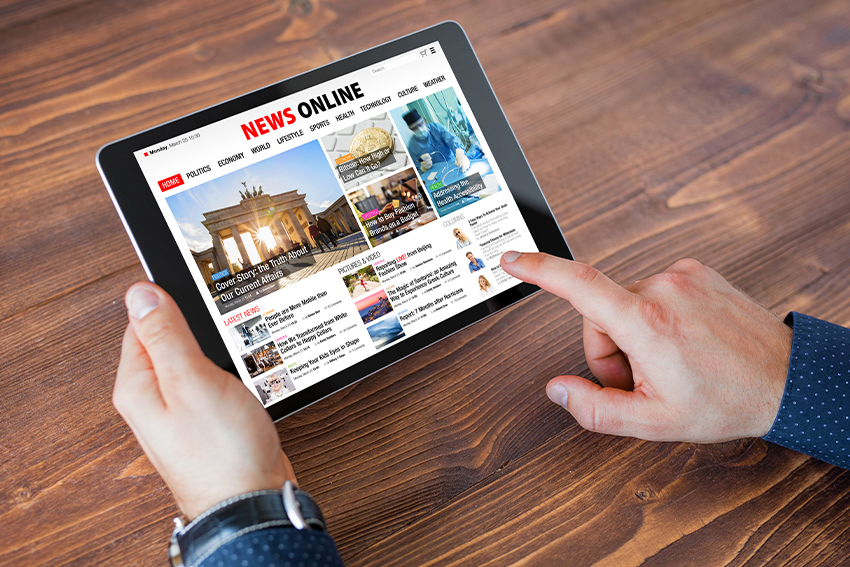The Ultimate Guide To International News Online
Table of ContentsInternational News Online Fundamentals ExplainedIndicators on International News Online You Should KnowGetting The International News Online To WorkUnknown Facts About International News OnlineUnknown Facts About International News Online
Some social media sites regardless of having relatively little general target markets stand out for having high shares of customers that regularly go to the website for news. On the other hand, just 15% of Snapchat customers routinely obtain news on the app.
journalists, yet not for the public, June 27, 2022 News on Twitter: Consumed by A Lot Of Users and Relied On by Lots of, Nov. 15, 2021 Even more than eight-in-ten Americans get news from electronic devices, Jan. 12, 2021 Measuring Information Usage in a Digital Period, Dec. 8, 2020 Lots Of Americans Obtain News on YouTube, Where News Organizations and Independent Producers Flourish Side-by-side, Sept.
The Facts About International News Online Uncovered
When asked whether social media sites is a great or bad point for democracy in their country, an average of 57% throughout 19 nations claim that it is an advantage (International News Online). In nearly every nation, near half or more say this, with the sentiment most usual in Singapore, where approximately three-quarters believe social media is a great thing for freedom in their nation.
And in the united state, just around a 3rd think social media sites declares for democracy the tiniest share among all 19 countries evaluated. In eight nations, those that think that the political system in their nation permits them to have an impact on national politics are also a lot more likely to claim that social networks is an advantage for freedom.
Those who view the spread of incorrect info online as a significant threat to their nation are much less most likely to claim that social media is a good point for democracy, contrasted with those that watch the spread of false information online as either a minor danger or otherwise a threat in all.
The 5-Minute Rule for International News Online
Older grownups in 12 countries are less most likely to claim that social media is an excellent point for democracy in their nation when compared to their more youthful equivalents. In Japan, France, Israel, Hungary, the UK and Australia, the space between the youngest and earliest age groups is at least 20 portion points and varies as high as 41 points in Poland, where nearly nine-in-ten (87%) more youthful grownups say that social media has been a good point for democracy in the nation and only 46% of adults over 50 state the same.
Throughout the 6 problems checked, few have a tendency to claim they see no modifications due to raised connectivity instead seeing things transforming both favorably and negatively and commonly both at the same time (International News Online). An average of 84% claim technological connection has made individuals easier to manipulate with false info and rumors the most among the six concerns examined
Indeed, in a lot of nations, those who believe social media has made it less complicated to manipulate people with misinformation and reports are also most likely to believe that social networks has actually made people much more educated. When it pertains to national politics, the net and social media are generally viewed as turbulent, with a typical of 65% claiming that individuals are now much more split in their political opinions.
The 3-Minute Rule for International News Online
This feeling of risk is connected to the prevalent idea that people today are currently less complicated to manipulate with incorrect information and rumors thanks to the internet and social media sites. Around fifty percent or more in every nation checked shares this sight. And in areas like the Netherlands, Australia and the UK, around nine-in-ten see people as even web link more manipulable.
In South Korea, 90% of those under age 30 say social media makes people less complicated to control, compared with 65% of those 50 and older. (Remarkably, U.S.-focused research has discovered older adults are extra likely to share misinformation than more youthful ones.) Individuals with even more education are also commonly most likely than those with less education and learning to claim that social media has actually resulted in individuals being easier to control.

More About International News Online
In Sweden, Japan, Greece and the Netherlands, around eight-in-ten or more share this view, while in Malaysia, a smaller bulk (56%) claims the exact same. Younger adults tend to see social media sites making people extra educated than older grownups do. Older adults, for their component, don't necessarily see the internet and social media making people less informed about what's taking place in their nation; instead, they're rather a lot more likely to describe these platforms as having little effect on individuals's info levels.
